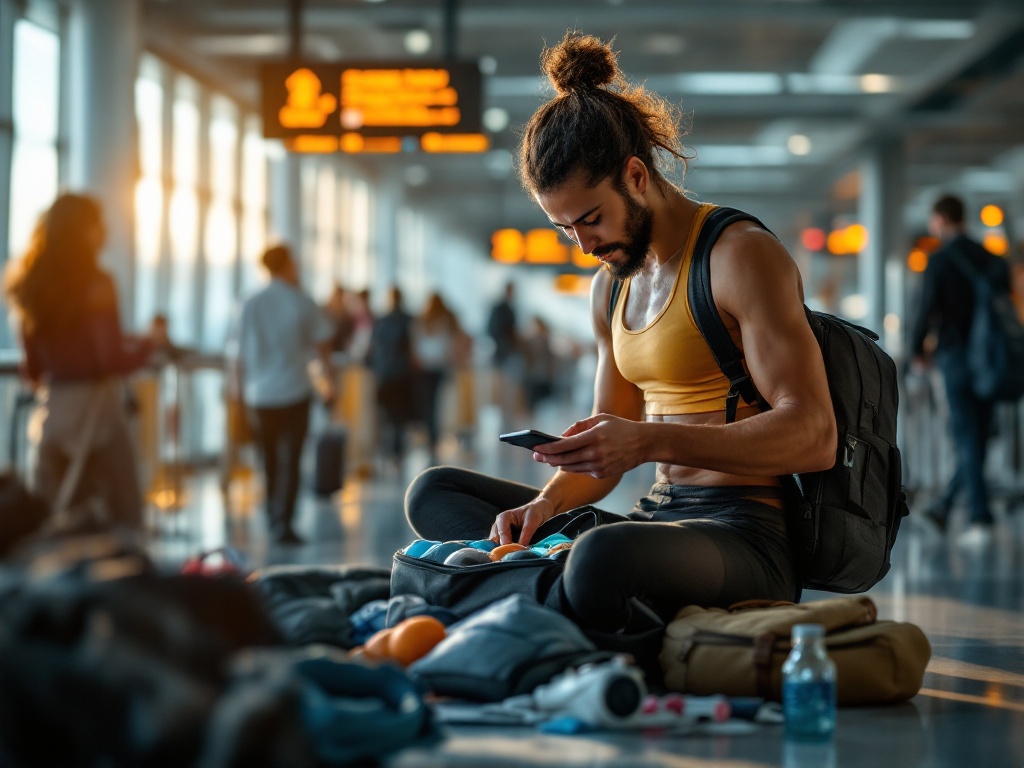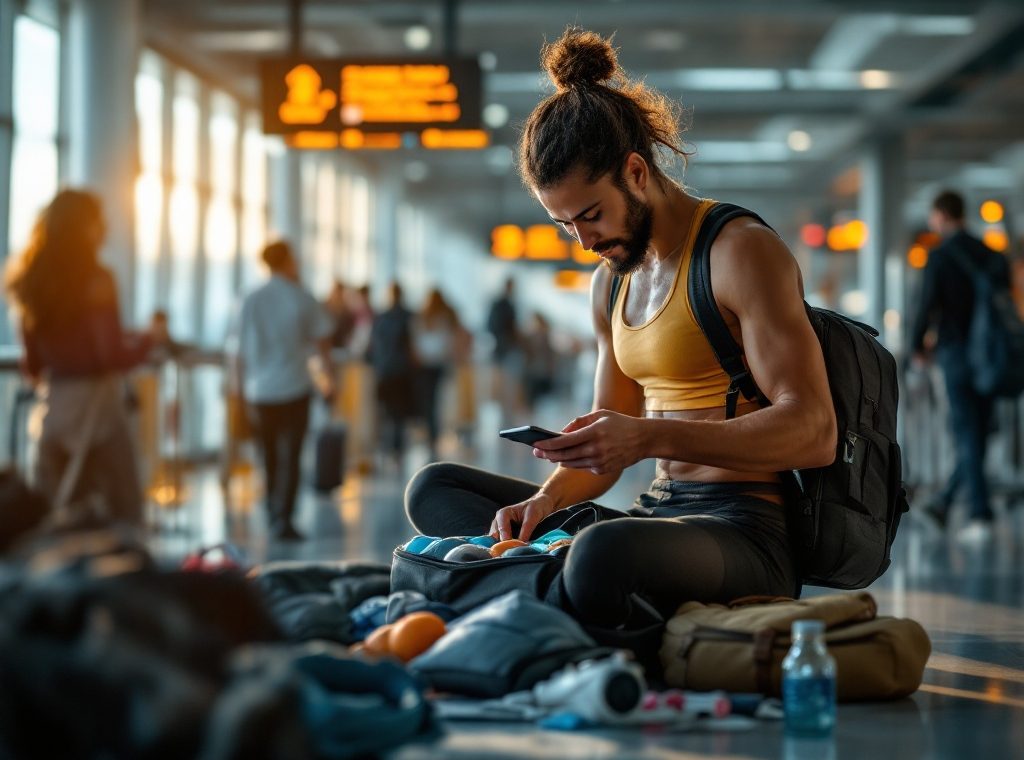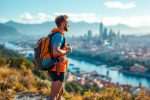Essential Travel Tips for Athletes
Traveling for competition? Don’t let travel logistics hinder your peak performance. This guide provides crucial advice for athletes, from securing travel documents and packing essential gear to managing jet lag and adapting to new climates. Learn how to prioritize your well-being and maximize your athletic potential on the road. Discover tips for staying healthy, hydrated, and focused, ensuring you’re ready to compete at your best. Start your journey to success now!
Important information

- Prepare travel documents (passport, visas, medical certificates) well in advance.
- Purchase emergency travel medical insurance to cover unforeseen medical expenses, evacuations, and repatriation.
- Pack workout essentials, appropriate clothing for the destination’s climate, personal items, and a first-aid kit.
- Stay hydrated, especially during flights, and consider electrolyte supplements for intense activity or hot climates.
- Minimize jet lag by adjusting your sleep schedule before departure, getting sunlight upon arrival, and staying hydrated.
Travel Preparation for Athletes
Prepare travel documents. Ensure your passport, visas, and medical certificates are ready well in advance.
Arrive early at the airport. This minimizes potential travel disruptions and allows for a smoother transition, fostering a more relaxed pre-competition mindset.
Focus on your performance. By prioritizing travel arrangements and arriving early, athletes can dedicate their energy to optimal performance rather than logistical hurdles.
Prepare Your Travel Documents in Advance
Check your passport’s expiration date, as some countries require at least six months of validity remaining.
Research your destination’s specific visa requirements, which can vary.
Gather your travel documents early to streamline your trip planning.
Purchase Emergency Travel Medical Insurance
Traveling abroad? Medical insurance is a must-have. It safeguards you from unforeseen medical expenses, especially crucial for athletes given their higher risk of injury. This coverage handles not only medical bills, but also emergency evacuations and repatriation. Get it before your trip – it’s an essential safety net.
Pack Important Equipment and Clothing
Pack your carry-on bag with workout essentials like running shoes, resistance bands, and portable training equipment. A travel yoga mat is great for stretching. Don’t forget supplements and recovery tools such as a foam roller. Consider the destination’s climate and pack versatile, layered clothing, along with any sport-specific gear. Also, remember essential personal items and a first-aid kit. This ensures you’re fully prepared for training and recovery on the go.
Travel Essentials and Safety Gear
Pack a travel kit with essential toiletries and personal care items.
Remember any necessary medications.
Include a small first-aid kit stocked with bandages, antiseptic wipes, and pain relievers.
For added safety, consider a personal safety alarm, a doorstop alarm, or a portable lock.
Bring a travel adapter and portable charger to keep your electronics powered up.
Pack a Travel Kit with Essentials
Pack a travel first-aid kit with essential supplies like bandages, antiseptic wipes, and pain relievers. Don’t forget to maintain good hygiene by packing a toothbrush, toothpaste, deodorant, and sunscreen. Remember to bring necessary personal items, including medications, contact lenses, and any specific toiletries you require.
Transporting Equipment and Gear
Pack your equipment securely, following airline regulations to prevent damage during transport. Consider a specialized equipment bag for extra protection, especially for sporting goods, training aids, or competition attire.
Managing Health and Safety During Travel
Traveling smart means staying informed. Check travel advisories from reliable sources like the US Department of State and the CDC for important safety, health, and entry requirement updates.
Hydration
Hydration is key for athletes, especially when traveling. Dehydration can sap your energy, affect your focus, and hinder your physical abilities. Drink plenty of water, especially on flights to combat dry cabin air. Electrolyte drinks can provide an added boost after workouts or in hot climates.
Staying Active
Staying active during long flights helps prevent muscle stiffness and poor circulation. Simple exercises like ankle rotations, neck stretches, and seated leg raises can make a big difference. Use layovers as opportunities to walk and move around.
Jet Lag
Jet lag can seriously disrupt sleep and athletic performance. Minimize its effects by adjusting your sleep schedule before you leave. Upon arrival, get some sunlight and adapt to the local time zone quickly to help your body adjust.
Stay Informed on Travel Advisories
Before traveling, thoroughly research your destination using official government websites. Valuable resources include the US Department of State or the UK Foreign, Commonwealth & Development Office. These websites offer travel advisories, alerts, and crucial updates on safety, security, and health. Consider enrolling in the Smart Traveler Enrollment Program (STEP) to receive important information and emergency assistance. Additionally, monitor news outlets and social media platforms for real-time updates on potential disruptions or safety concerns. If needed, contact your embassy or consulate for immediate support.
Maintain Hydration Levels
Staying hydrated is key, especially during air travel. The dry cabin air can dehydrate you quickly, so carry a reusable water bottle and drink plenty of water before, during, and after your flight. Aim to keep fluid loss below two percent of your body weight. Electrolyte supplements can provide extra hydration support, especially in hot climates or during intense activity. Checking your urine color is a simple way to gauge your hydration: pale yellow means you’re well-hydrated.
Stay Active During the Flight
Walk around the cabin to loosen up your legs, ankles, arms, and neck.
This easy exercise improves circulation and helps prevent blood clots and stiffness.
Staying mobile is essential, especially on lengthy journeys.
Reduce Jet Lag
Adjust your sleep schedule a few days before your trip to minimize jet lag.
Stay hydrated on the plane by drinking plenty of water. Avoid alcohol and caffeine, as they can dehydrate you and worsen jet lag.
Upon arrival, expose yourself to sunlight to help regulate your body clock. Stay active, even a short walk can make a difference.
If you feel tired, take a short nap (20-30 minutes) to refresh yourself without disrupting your nighttime sleep.
Nutrition and Dietary Considerations
Maintaining a healthy diet while traveling can be challenging, but with a little planning, you can stay on track. Meal prepping is essential, especially if you have specific dietary requirements. Packing snacks like nuts, seeds, and dried fruit can help you avoid unhealthy temptations when you’re on the go. Once you arrive at your destination, explore local markets for fresh, healthy options. Consider consulting a sports dietitian to create a personalized meal plan tailored to your travel needs and activity level.
Prioritize Nutrients
While traveling can disrupt your routine, remember to prioritize essential nutrients:
- Protein aids muscle recovery.
- Complex carbohydrates provide sustained energy.
- Fruits and vegetables are packed with essential vitamins and minerals.
Portion Control
Don’t forget to adjust your portion sizes based on your activity levels. If you’re more active while traveling, you’ll need more calories. Conversely, if you’re less active, reduce your portions to maintain a healthy balance.
Plan Meals and Snacks
Traveling athletes should carefully consider their food choices. Packing nutrient-rich, non-perishable items is a smart strategy. Some good choices include protein bars, nuts, and dried fruit. Additionally, researching restaurants and grocery stores near your destination ensures access to healthy meals. Hydration is also essential, so keep a refillable water bottle handy. This preparation will help you stay energized and hydrated throughout your travels.
Maintain Nutrition Regimens
Traveling athletes can easily maintain their nutrition by packing familiar foods and supplements, creating a sense of normalcy. Pre-planning meals and knowing where to eat saves time and reduces stress. Athletes can also choose accommodations with kitchens to prepare home-cooked meals. A regular meal schedule is vital for regulating energy levels, especially with travel disruptions. Staying hydrated is also crucial, so carry a reusable water bottle and prioritize fluid intake. Traveling with dietary restrictions presents unique challenges; therefore, researching local restaurants and grocery stores beforehand is a smart move to ensure dietary needs are met.
Pack familiar foods and supplements to maintain nutritional balance and create a sense of normalcy.
Pre-plan meals and research dining options to save time and reduce stress.
Consider accommodations with kitchens for preparing home-cooked meals.
Maintain a regular meal schedule to regulate energy levels, especially important during travel disruptions.
Carry a reusable water bottle and prioritize fluid intake to stay hydrated.
If you have dietary restrictions, research local restaurants and grocery stores beforehand to ensure your needs are met.
Adapting to New Environments
Peak athletic performance hinges on adapting to new time zones. One approach is gradually adjusting your sleep schedule before departure. Upon arrival, exposure to bright light helps synchronize your body with the local time. Coping with varied climates and extreme weather is also essential. Clothing choices play a significant role, as do hydration and training modifications.
Tips for Peak Athletic Performance in Diverse Climates
- Gradually adjust your sleep schedule before traveling to a new time zone.
- Upon arrival, expose yourself to bright light to synchronize with local time.
- Prioritize proper hydration and electrolyte balance, crucial for optimal performance.
Adaptations for Varied Climates
- Wear breathable fabrics in hot climates.
- Consider altitude training for competitions in mountainous regions.
- Modify training intensity and duration based on the climate.
Adjust to Different Time Zones
Gradually adjust your sleep schedule before departure, ideally shifting bedtimes and wake-up times by an hour or two daily. This helps your body slowly adapt to the new time zone.
Align meal times and training to the destination time zone before your trip. This further aids the body’s acclimation process.
Upon arrival, maximize natural light exposure, especially sunlight. This is vital for regulating your internal clock and minimizing jet lag.
Stay well-hydrated throughout your travel and upon arrival. This is crucial for minimizing jet lag’s impact and ensuring peak athletic performance.
Acclimate to Local Climate and Extreme Weather
To optimize performance and safeguard health, athletes must acclimatize to the competition environment. Hydration is essential, and training should adapt to heat and humidity. Appropriate clothing and gear are also crucial. Studies demonstrate that heat acclimatization enhances cardiovascular function and thermoregulation.
Conversely, cold weather necessitates different tactics, such as layering clothing and protecting exposed skin to prevent injuries. Gradual acclimatization, regardless of the climate, minimizes health risks.


















